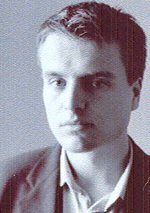Joris Luyendijk, born in Amsterdam, the Netherlands, in 1971. M.A. in Religious Anthropology from the University of Amsterdam. Middle-East Correspondent for the liberal Dutch daily NRC Handelsblad (from 1998-2003) as well as for National Public Radio and Television. Winner of the Gouden Pennetje Award for promising journalists under thirty (2002).
Writer-in-Residence (1 February 2004 – 30 June 2004)
CAIRO, BEIRUT, JERUSALEM, BETWEEN HATE AND FEAR
During my five-month stay at NIAS, I continued my work on a book about the modern mass media and the Middle East. The peace and quiet that NIAS provides was the perfect environment to do what a writer dreads most: structuring one’s argument. I made great headway in the set-up of my book and wrote three of its six chapters. I hope to conclude the book by Christmas 2004, after which publication should take place somewhere in Spring 2005. The book deals with one recurring experience during my work as a Middle East correspondent, first in Cairo, then in Beirut and then in occupied East-Jerusalem. This was the enormous gap between reality on the ground as I perceived it, and its representation in the modern mass media. I intend to demonstrate that contemporary journalists are not to be believed when they present themselves implicitly or explicitly as flies on the wall, as mirrors merely reflecting what happened. In reality journalists are often the pink elephants in the room; everyone knows they are there but no one talks about it, let alone venture to discuss their impact on that room. The book attempts to describe the many filters between what journalists see ‘on the ground’ and how it ends up in a newspaper or television newsreel. This boils down to ‘words and images’, the vocabulary with which we describe what happened, and the footage we show as illustration. The words journalists use are often coloured by specifically Western historical experience, by political lobbying, by cultural bias or by plain ignorance. The images journalists use are easily manipulated by governments and lobby groups, given the fundamental vulnerability of TV as a medium particularly in a commercially competitive environment.
It is my sincere hope to make my points without dumbing down or turning it into an abstract exposé for the learned few. Given the demise of political parties, churches, societies and labour unions, the mass media are now the most important layer between the individual and the state. The modern mass media are enormously powerful, which in a democracy implies that this power must somehow be examined and checked. If anything, I intend this book to be an accessible contribution to this endeavour.
